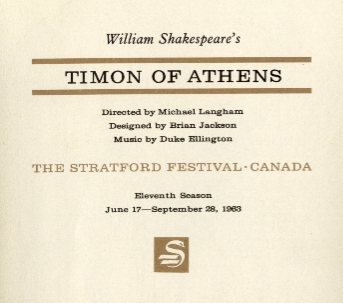Previously on Timon of Athens: In the first act of the play, we meet not only our title character–a rich patron, generous to a fault–but also an entire cast of sycophants and hangers-on who take advantage of the man’s foolish giving. We also meet Apemantus–a misanthropic rogue who comments sarcastically on what he sees–and Alcibiades–an Athenian general returned from the wars. We witness one of Timon’s extravagant parties, and learn from his steward Flavius what Timon himself doesn’t yet know–that he has given all away and is now in debt.
In the short first scene of Act Two, an Athenian senator in soliloquy (the first verse one in the play; Apemantus has a 4-line throwaway at the end of Act One) reveals that Timon’s fancy parties have been funded by borrowings, including those from this senator, and at least three others. The senator calls in his servant and sends him to collect the debt. There’s no malice, only a present need for money by the senator, though he does realize
When every feather sticks in his own wing
Lord Timon will be left a naked gull,
Which flashes now a phoenix.
This senator know that if all collect their moneys (“every feather”) from Timon, he’ll be reduced to a “naked gull,” but this doesn’t trouble the senator because Timon is a phoenix, a bird who can rise from his own ashes.
Timon will be just fine.
Or will he?
Continue reading “Timon of Athens — Act Two: IOU, you owe me”

